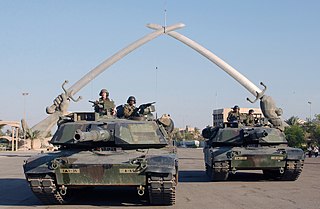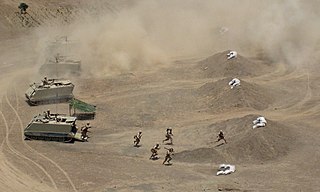
Iraq actively researched and later employed weapons of mass destruction from 1962 to 1991, when it destroyed its chemical weapons stockpile and halted its biological and nuclear weapon programs. The fifth president of Iraq, Saddam Hussein, was internationally condemned for his use of chemical weapons during the 1980s campaign against Iranian and Kurdish civilians during and after the Iran–Iraq War. In the 1980s, Saddam pursued an extensive biological weapons program and a nuclear weapons program, though no nuclear bomb was built. After the Persian Gulf War (1990-1991), the United Nations located and destroyed large quantities of Iraqi chemical weapons and related equipment and materials, and Iraq ceased both its chemical, biological and nuclear programs.

Not to be confused with Syrian Republican Guard

The Gulf War, codenamed Operation Desert Shield for operations leading to the buildup of troops and defense of Saudi Arabia and Operation Desert Storm in its combat phase, was a war waged by coalition forces from 35 nations led by the United States against Iraq in response to Iraq's invasion and annexation of Kuwait arising from oil pricing and production disputes. The war is also known under other names, such as the Persian Gulf War, First Gulf War, Gulf War I, Kuwait War, First Iraq War or Iraq War, before the term "Iraq War" became identified instead with the 2003 Iraq War.

The 2003 invasion of Iraq was the first stage of the Iraq War. The invasion phase began on 19 March 2003 and lasted just over one month, including 21 days of major combat operations, in which a combined force of troops from the United States, the United Kingdom, Australia and Poland invaded Iraq. This early stage of the war formally ended on 1 May 2003 when U.S. President George W. Bush declared the "End of Major Combat Operations", after which the Coalition Provisional Authority (CPA) was established as the first of several successive transitional governments leading up to the first Iraqi parliamentary election in January 2005. U.S. military forces later remained in Iraq until the withdrawal in 2011.

The ‘’December 1998 bombing of Iraq' was a major four-day bombing campaign on Iraqi targets from 16 December 1998, to 19 December 1998, by the United States and the United Kingdom. The contemporaneous justification for the strikes was Iraq's failure to comply with United Nations Security Council resolutions and its interference with United Nations Special Commission inspectors.

The XVIII Airborne Corps is a corps of the United States Army that has been in existence since 1942 and saw extensive service during World War II. The corps is designed for rapid deployment anywhere in the world and is referred to as "America's Contingency Corps". Its headquarters are at Fort Bragg, North Carolina.
Millennium Challenge 2002 (MC02) was a major war game exercise conducted by the United States Armed Forces in mid-2002. The exercise, which ran from July 24 to August 15 and cost $250 million, involved both live exercises and computer simulations. MC02 was meant to be a test of future military "transformation"—a transition toward new technologies that enable network-centric warfare and provide more effective command and control of current and future weaponry and tactics. The simulated combatants were the United States, referred to as "Blue", and an unknown adversary in the Middle East, "Red", with many lines of evidence pointing at Iran being the Red side.
The following lists events in the year 2003 in Iraq.

The Battle of Khafji was the first major ground engagement of the Persian Gulf War. It took place in and around the Saudi Arabian city of Khafji, from 29 January to 1 February 1991 and marked the culmination of the Coalition's air campaign over Kuwait and Iraq, which had begun on 17 January 1991.

The Iraqi Army, officially the Iraqi Ground Forces, is the ground force component of the Iraqi Armed Forces, having been active in various incarnations throughout the 20th and 21st centuries. It was known as the Royal Iraqi Army up until the coup of July 1958.

The U.S. rationale for the Iraq War has faced heavy criticism from an array of popular and official sources both inside and outside the United States. Putting this controversy aside, both proponents and opponents of the invasion have also criticised the prosecution of the war effort along a number of lines. Most significantly, critics have assailed the U.S. and its allies for not devoting enough troops to the mission, not adequately planning for post-invasion Iraq, and for permitting and perpetrating widespread human rights abuses. As the war has progressed, critics have also railed against the high human and financial costs.

A dispute exists over the legitimacy of the 2003 invasion of Iraq. The debate centers around the question whether the invasion was an unprovoked assault on an independent country that may have breached international law, or if the United Nations Security Council authorized the invasion. Those arguing for its legitimacy often point to Congressional Joint Resolution 114 and UN Security Council resolutions, such as Resolution 1441 and Resolution 678. Those arguing against its legitimacy also cite some of the same sources, stating they do not actually permit war but instead lay out conditions that must be met before war can be declared. Furthermore, the Security Council may only authorise the use of force against an "aggressor" in the interests of preserving peace, whereas the 2003 invasion of Iraq was not provoked by any aggressive military action.
The following lists events that happened during 2006 in Iraq.

The Iraqi Armed Forces are the military forces of the Government of Iraq. They consist of the Iraqi Army, the Iraqi Air Force, and the Iraqi Navy.

The Iraq War was a protracted armed conflict that began in 2003 with the invasion of Iraq by a United States-led coalition that overthrew the government of Saddam Hussein. The conflict continued for much of the next decade as an insurgency emerged to oppose the occupying forces and the post-invasion Iraqi government. An estimated 151,000 to 600,000 or more Iraqis were killed in the first three to four years of conflict. The U.S. became re-involved in 2014 at the head of a new coalition; the insurgency and many dimensions of the civil armed conflict continue. The invasion occurred as part of a declared war against international terrorism and its sponsors under the administration of U.S. President George W. Bush following the September 11 terrorist attacks.

WMD conjecture in the aftermath of the 2003 invasion of Iraq concerns the immediate reactions and consequences to the failure by the United Nations Monitoring, Verification and Inspection Commission (UNMOVIC) and the U.S.-led Iraq Survey Group (ISG) to find the alleged stockpiles of weapons of mass destruction during and after 2003 invasion of Iraq. The United States effectively terminated the search effort for unconventional weaponry in January 2005, and the Iraq Intelligence Commission concluded that the judgements of the U.S. intelligence community about the continued existence of weapons of mass destruction and an associated military program were wrong. The official findings by the CIA in October 2004 were that Iraqi leader Saddam Hussein "did not possess stockpiles of illicit weapons at the time of the U.S. invasion in March 2003 and had not begun any program to produce them."

The United States Army Central, formerly the Third United States Army, commonly referred to as the Third Army and as ARCENT is a military formation of the United States Army, which saw service in World War I and World War II, in the 1991 Gulf War, and in the coalition occupation of Iraq. It is best known for its campaigns in World War II under the command of General George S. Patton.

Lieutenant General Sean Barry MacFarland is a retired three-star general who served in the United States Army.
The timeline of the Gulf War details the dates of the major events of the 1990–1991 war. It began with the Iraqi invasion of Kuwait on 2 August 1990 and ended with the Liberation of Kuwait by Coalition forces. Iraq subsequently agreed to the United Nations' demands on 28 February 1991. The war officially concluded with the signing of the armistice on 11 April 1991. Major events in the aftermath include anti-Saddam Hussein uprisings in Iraq, massacres against the Kurds by the regime, Iraq formally recognizing the sovereignty of Kuwait in 1994, and eventually ending its cooperation with the United Nations Special Commission in 1998.















